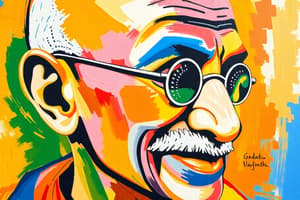Podcast
Questions and Answers
What is Mahatma Gandhi known as in India?
What is Mahatma Gandhi known as in India?
- Prime Minister
- Leader of the Congress Party
- Father of the Nation (correct)
- Champion of Democracy
At what age did Gandhi marry Kasturba Makhanji?
At what age did Gandhi marry Kasturba Makhanji?
- 20
- 18
- 13 (correct)
- 15
Which movement did Gandhi NOT lead?
Which movement did Gandhi NOT lead?
- Quit India Movement
- Civil Disobedience Movement
- Salt March
- Non-Profit Movement (correct)
What does 'ahimsa' refer to in Gandhi's philosophy?
What does 'ahimsa' refer to in Gandhi's philosophy?
What was the purpose of the Salt March?
What was the purpose of the Salt March?
Gandhi spent 21 years in which country fighting against discrimination?
Gandhi spent 21 years in which country fighting against discrimination?
Who assassinated Mahatma Gandhi?
Who assassinated Mahatma Gandhi?
What did Gandhi encourage Indians to boycott?
What did Gandhi encourage Indians to boycott?
Which leaders were inspired by Gandhi's philosophy?
Which leaders were inspired by Gandhi's philosophy?
What was Gandhi's primary method in political activism?
What was Gandhi's primary method in political activism?
Flashcards are hidden until you start studying
Study Notes
Introduction
- Mahatma Gandhi, known as the Father of the Nation in India, significantly contributed to India's independence from British rule.
- His methods of non-violence and civil disobedience influenced global civil rights movements.
Early Life
- Born on October 2, 1869, in Porbandar, India, to a middle-class family.
- Married Kasturba Makhanji at the age of 13.
- Moved to London at 18 to study law and later returned to practice law in India.
- Spent 21 years in South Africa combating discrimination.
Return to India and Fight for Independence
- Returned to India in 1915 and engaged in the independence movement.
- Led significant campaigns such as the Non-Cooperation Movement, Civil Disobedience Movement, and Quit India Movement.
- Promoted the boycott of British goods and institutions as a means of resistance.
Philosophy of Non-Violence
- Non-violence, termed ahimsa, was the cornerstone of Gandhi's activism.
- Advocated that violence perpetuates further violence; peaceful methods yield more sustainable change.
- His philosophy inspired global leaders like Martin Luther King Jr. and Nelson Mandela.
Salt March
- The Salt March in 1930 was a pivotal act of civil disobedience against the British salt tax.
- Gandhi and followers covered 240 miles to the Arabian Sea to produce their own salt.
- This act garnered international attention and showcased the injustices of British colonial rule.
Legacy
- Assassinated on January 30, 1948, by a Hindu nationalist opposed to his advocacy for religious tolerance.
- Gandhi's legacy endures, with his principles of non-violence and peaceful protest continuing to inspire justice and equality movements worldwide.
Studying That Suits You
Use AI to generate personalized quizzes and flashcards to suit your learning preferences.




